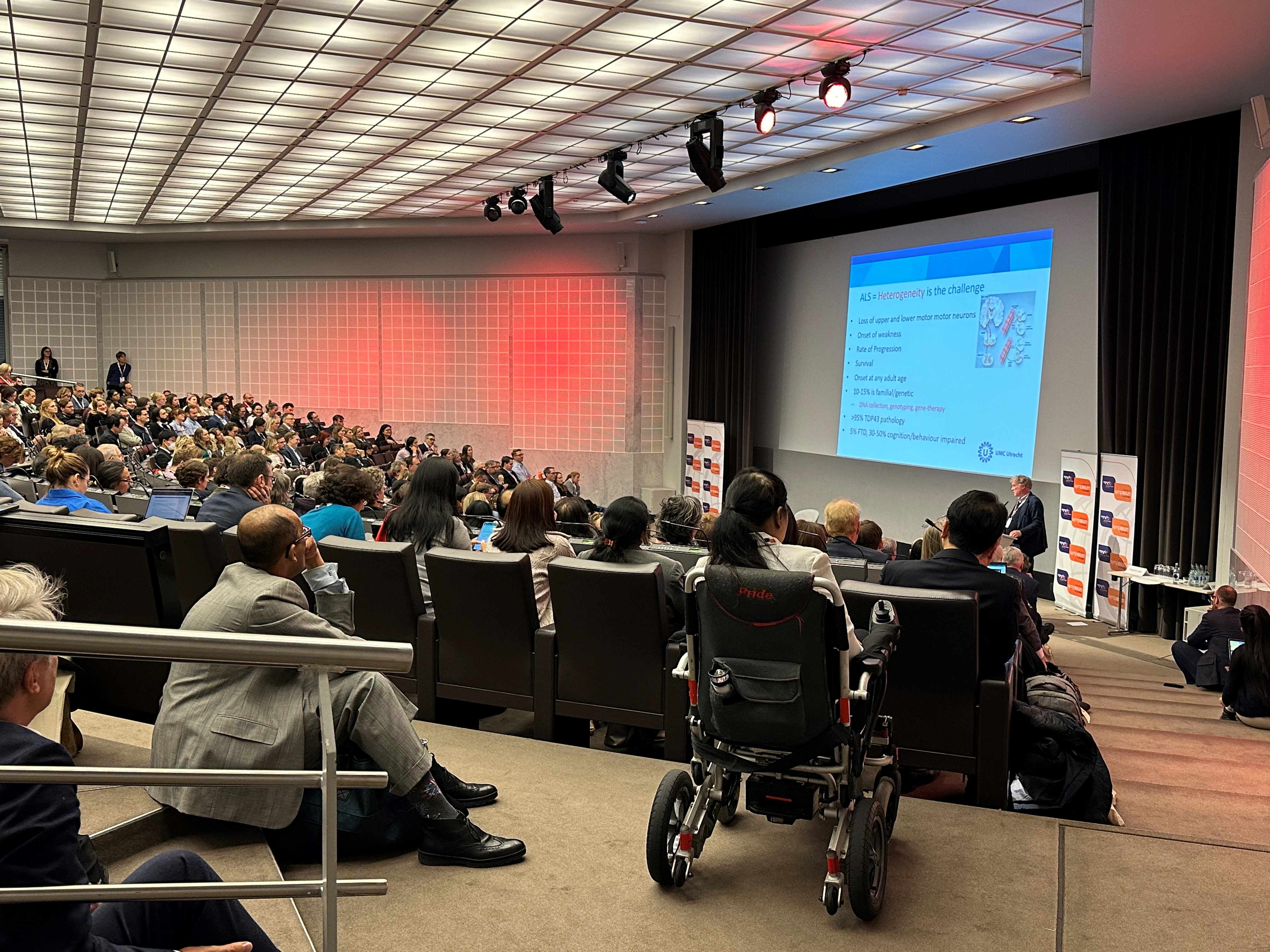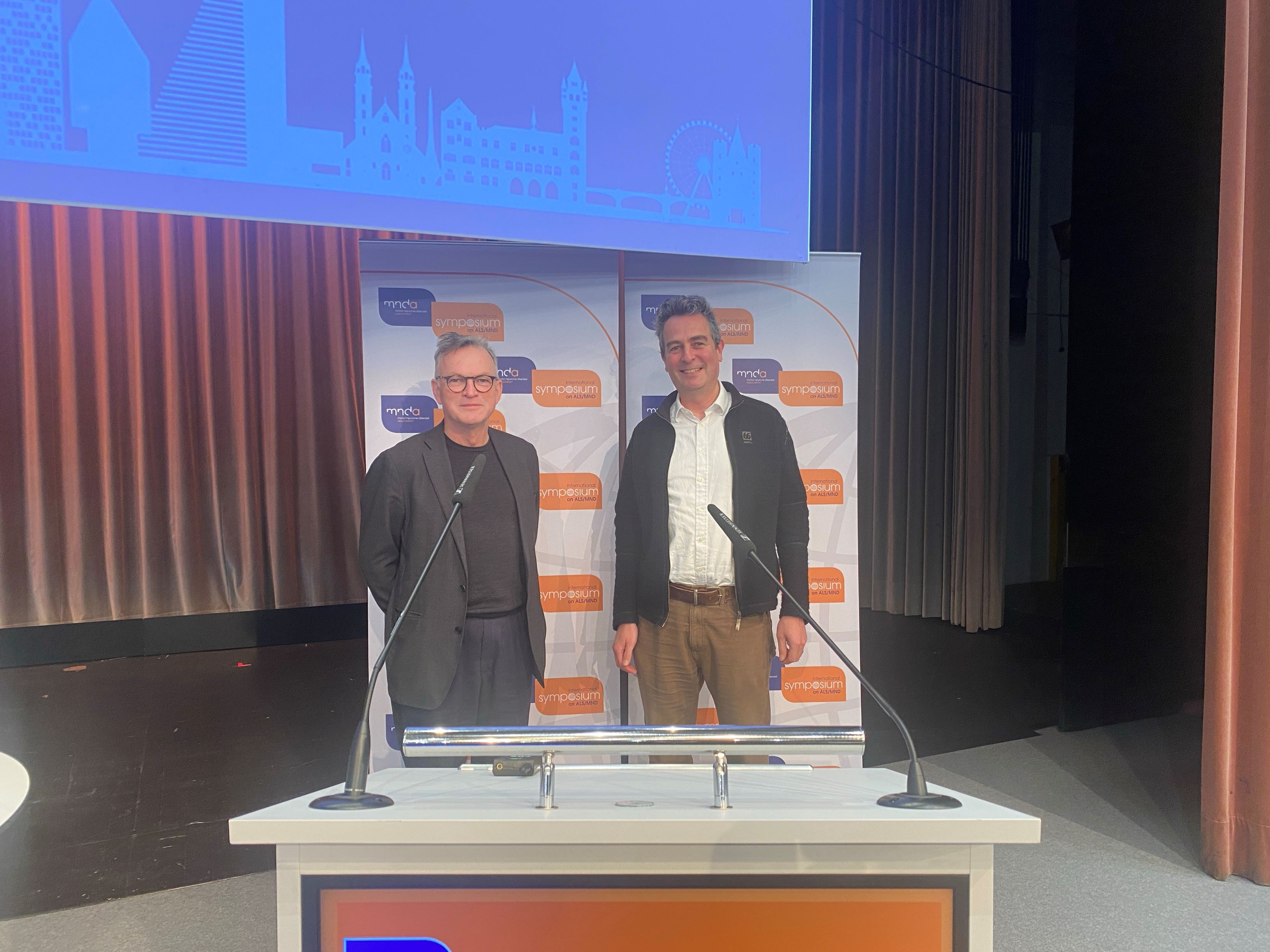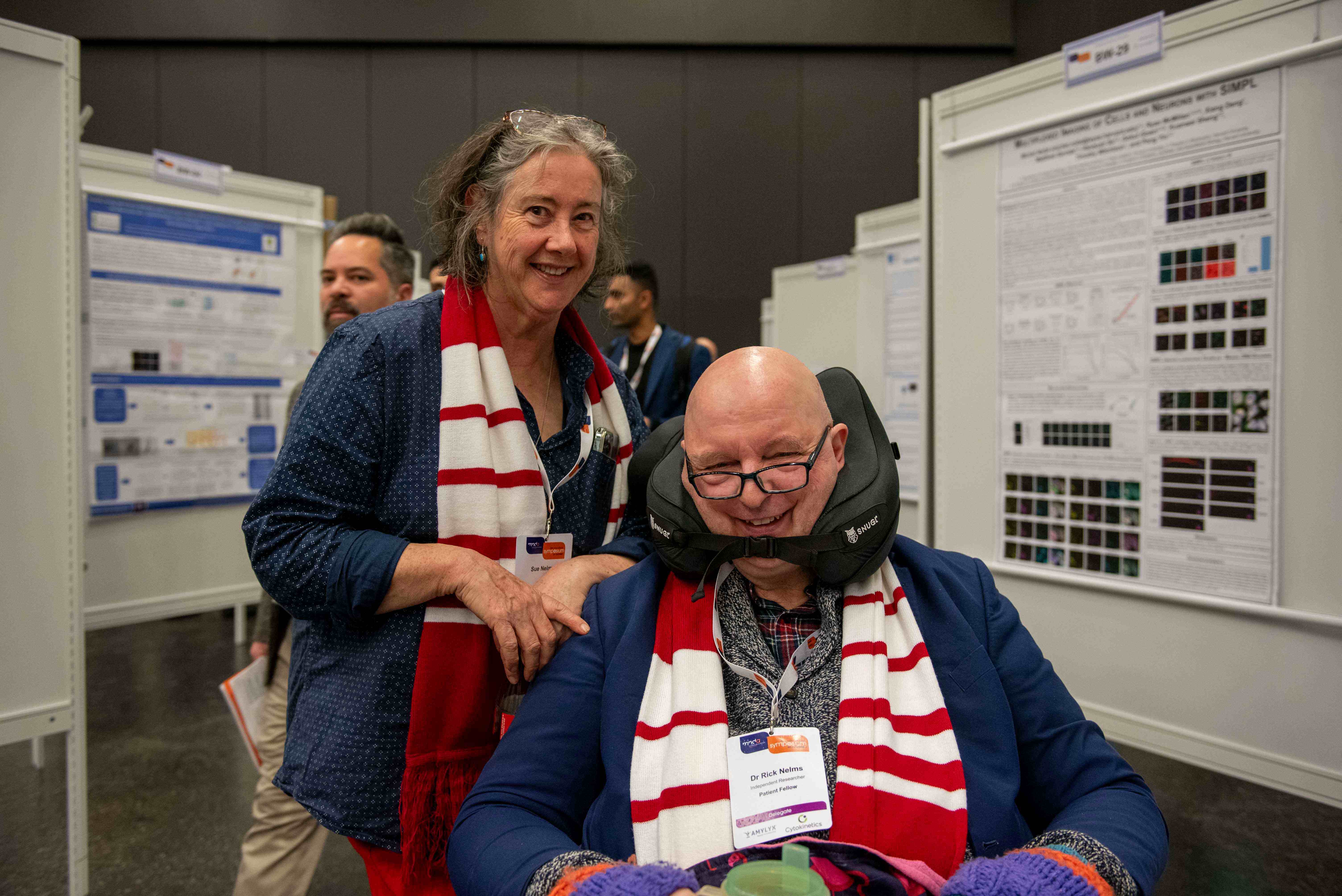15 December 2023 News
More than 1300 people gathered in Basel, Switzerland to hear the latest in motor neurone disease (MND) research at the MND Association’s International Symposium on ALS/MND from December 6-8. We welcomed a further 300 delegates who attended online.
The Symposium, which is the largest medical and scientific conference on MND, opened its doors to one of the largest ever number of delegates who eagerly engaged in discussion and debate with their counterparts from across the world after three years of attending the event online.
With a shared passion for MND research and a commitment to ultimately finding a cure, clinicians, researchers, health and social care professionals and patient fellows spent time before and between every session making new connections, forming new alliances, sharing updates.
Stephen Hawking Memorial Lecture
The Stephen Hawking Memorial Lecture is delivered each year at the Symposium in memory of Professor Stephen Hawking. Keynote speaker Professor Rui Costa, President and CEO of the Allen Institute for Brain Science, USA is an expert in brain circuitry that underlies movement. The research from the Institute informs new approaches to treatment for neurological diseases and all data and resources are made open and publicly available. The team at the Allen Institute believes shared understanding accelerates new discoveries and nurtures breakthroughs and this is applicable to MND as well as other diseases. He showed what can be done with vision, funds, high technology, along with a very coordinated approach which benefits everybody. Other big data resources such as the UK Biobank are also open to the world, and this collaborative approach is changing medicine at a fast pace.
Celebrating ‘Symposium-born’ partnerships
The benefits of conversations away from Symposium sessions and during breaks cannot be underestimated. It is at one such conversation during the 2003 Symposium that current leading clinician researchers Professor Kevin Talbot and Professor Martin Turner met and began their twenty year partnership. This is a good example of the importance of networking.
The Symposium is essential. It has been so pivotal to my career. I've been to every one since 2002 in Denmark. I only missed 2012 in Chicago because I was being interviewed for a fellowship! When you’re young you see senior people, you hear them talk, it's very inspiring. You might then meet them over lunch, that's really exciting. You also meet young people like yourself doing similar research, it’s a little bit of competition, and you get ideas. The Symposium is very powerful and it makes people feel they belong to this specific group of people. It’s a way that you that you grow as a scientist and you cannot overestimate the contribution this event has made to the science.
Professor Martin Turner, University of Oxford
We have very common ways of thinking. We like nothing more than spending an evening talking about MND, and that's often how the ideas come out really, through those kind of conversations. And that's very much a Symposium sort of thing.
Professor Kevin Talbot, University of Oxford
New collaborations were made this year, here are some examples of feedback shared with the MND Association about experiences at the Symposium.
I intend to collaborate with the patient mentioned to help translate MND research into plain English
Delegate (anon.)
I have made connections with researchers from Denmark and Australia who are completing similar research. I plan to meet with both of them in the new year to harmonise our work.
Delegate (anon.)
More highlights
Many early career researchers (ECRs) were present at the event too, including our very first Symposium Communications Ambassadors who helped share news from the sessions. It’s vital that ECRs have the opportunity to hear from well-established researchers but also, specifically, to form professional relationships with their peers.
Almost 400 poster presentations (short summaries of research) on a range of topics from healthcare to biomarkers to clinical trials were presented over two sessions. Dr Rick Nelms, one of our patient fellows at the Symposium, presented a very creative poster.
I put together a poster which features my art. But my art used to explain MND/ALS to people, ordinary people, because it's ordinary people who get MND/ALS and ordinary people don't understand scientific papers. So I'm working with SITraN in Sheffield, they are making summaries of papers called Readable Research, and I'm doing paintings to go with those summaries. That's what this poster is about. Those paintings provide additional visual scaffolding to allow ordinary people to understand the science that's going on right now.
Dr Rick Nelms, Patient Fellow
One of the poster prize winners was MND Association funded researcher Dr Bjorn Vahsen who is investigating the role changes in microglia (a type of cell which supports motor neurones) may play in the disease and whether these changes are a result of the C9orf72 mutation. Genes are the instructions that make you, you. In MND there can be changes (also known as mutations) to these instructions, which can lead to the development of MND. Many changes in genes have been linked to MND, including the most common gene mutation - C9orf72. Investigating the role that microglia play in the development and progression of C9orf72 MND may help to identify new therapeutic targets for future treatments.
The Symposium also retained its usual international flavour with delegates from all corners of the earth.
I particularly wanted to attend this Symposium because the pandemic has prevented us from seeing each other and from collaborating and networking in person. I'm here to represent the continent, and to get people excited about changing the landscape for ALS for Africans.
Professor Jeannine Heckmann, Professor of Neurology at the University of Cape Town in South Africa, neurologist at Groote Schuur hospital also in Cape Town, South Africa
Finally, the closing session brought a patient with FUS-ALS trialling the drug Jacifusen onto the stage. Changes in the FUS gene are much rarer (than C9orf72 mentioned earlier) and it can lead to an aggressive form of the disease. Developers of Jacifusen won the Lalji award for the gene therapy which is showing potential and currently in Phase 3 trials to fully test the benefits for FUS-ALS.
Our sincere thanks to all the presenters, speakers, volunteers and delegates for making this such a productive and engaging event.
Preparations are already underway for next year’s 35th International Symposium on ALS/MND which will be held in Montreal, Canada.
Follow our research X (formerly Twitter)
Read our research blog


